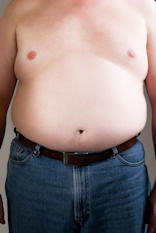
|

Men’s Health Risks
Men’s greatest health risks are:
- The fat they accumulate around their bellies and
- Their propensity to not think about their health
CDC statistics show that the average American man lives 5.3 fewer years than does the average woman. In 2003, male life expectancy was 74.8 years. Female life expectancy was 80.1 years.
Again, the two main reasons for lesser life-expectancy in men than women are:
|
|

|
- The first reason is that men typically store more deep abdominal and “belly fat” than do women. Abdominal fat is correlated to a MUCH greater risk of heart disease, diabetes, cancer and strokes than the “hip fat” of women. Deep abdominal fat also is correlated to insulin insensitivity, which is associated to higher blood sugar, and higher blood sugar levels promote protein glycation (damage) and cell death.
- The second reason is that men are less concerned with their health and more concerned with social activities such as smoking, drinking and using dangerous drugs than are women. All of these are free-radical threats to the longevity of one’s DNA.
|
There are, however, two more theories that are worth taking into account as you plan your health strategy for getting the maximum out of life:
- Greater Calorie Consumption by Men
Men eat more than women by about 600 calories per day average. Every calorie eaten causes a metabolic stress as mitochondria have to convert the calories into human useable energy. The more energy conversion, the more free radicals are produced. The more free radicals your body has to deal with the faster your body is damaged by those free radicals and deteriorates. (See our strategies to counteract this risk below.)
- Greater Arterial Lining Damage in Men’s Earlier Years
Women are protected during a significant part of their lives from arterial lining damage that promotes plaque and cholesterol buildup. This protection of women is due to the natural estrogen-progesterone monthly cycle that is part of menstruation and that doesn’t cease until after menopause. Estrogen instructs the body to replicate and renew cells (and is what causes the reproductive cycle to happen). Estrogen is basically a growth accelerator and enables the arterial linings in women to be regrown after free radical damage. Once women go through menopause, this natural protection is lost and heart disease rates for women begin to accelerate. (See our strategies to counteract this risk below.)
Health Protection Strategies
The four risk factors described above suggest several important strategies to avert health consequences. They are:
- Avoiding the deposition of fat around the belly by becoming and remaining a fat burner. An important part of teaching your body to burn fat for fuel instead of sugar is avoiding sugar and processed carbohydrates. Sugar-laden breakfast cereal, doughnuts, soda pop, etch are a man’s worst enemy. They give nothing of value and take away life by damaging insulin response to the point that the body remains perpetually in a fat storage mode, instead of fat-burning mode. Also, high blood sugar levels cause glycation of our cells, which is the next greatest cause (after free radicals) of cellular aging.
- Avoiding free radicals of all types. Free radical damage is accumulative. Specifically, men should avoid free radicals from smoking and drinking.
- Increasing one’s intake of antioxidants, which combat free radicals. Some of the best sources of antioxidants are:
- Protecting your arterial linings from damage. To do this, eat foods that promote methylation and increase nitric oxide in the blood.
|

|

Facts Regarding Men’s Health
In 1900, men and women had equal life expectancies. Eighty years later, women outlived men by nearly seven years. The outlook for men has improved lately so that now women outlive men by only by five years.
The reasons for this changing scenario is accounted for by the fact one hundred years ago , men and women both generally died at the same rates from infections, which was the leading cause of death. Women deaths from childbirth complications were about equally balanced by men’s deaths from workplace accidents.
Modern medicines have largely removed infections as a cause of death. And, doctors are much more capable of dealing with pregnancy complications and accident traumas.
So, now we are left with life expectancy being a matter of how well a person takes care of him/herself throughout his/her life.
And, in this regard, men are generally not as health conscious as women. For instance, only half as many men as women have a regular doctor.
As compared to women men are more likely to smoke and drink and take unnecessary risks.
Men are no longer as physically active as they were in previous eras. For instance, more than 50% of American men do not get enough daily physical activity (40 minutes of aerobic exercise) to provide health benefits in terms of avoiding fat deposition.
Men eat less healthy than women. For instance, men eat more:
- veal
- shellfish
- runny eggs
- frozen hamburgers
Women eat more :
- carrots
- blueberries
- almonds and walnuts
- yogurt
- alfalfa sprouts
|

